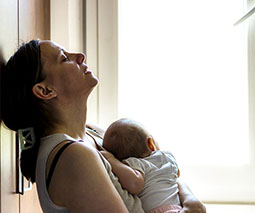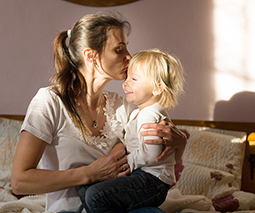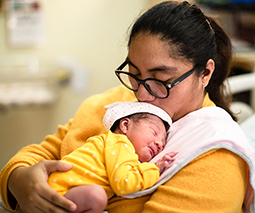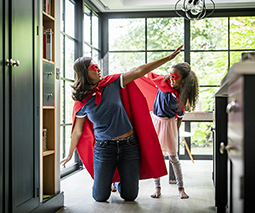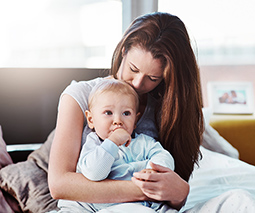How to silence your critical inner voice
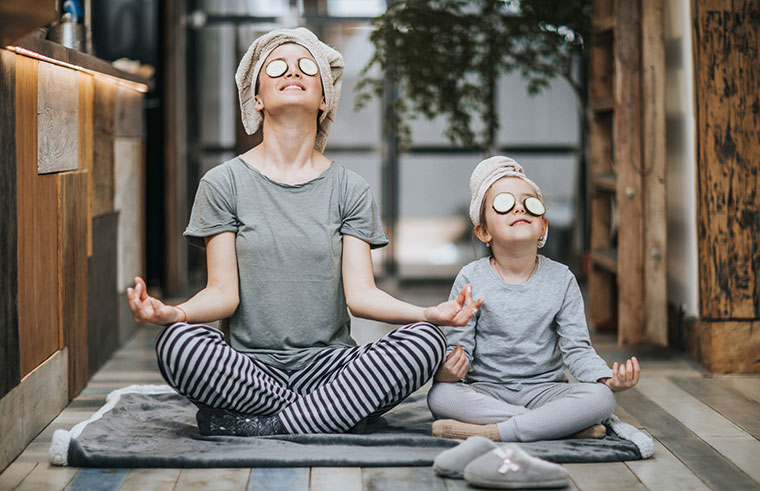
Life with a newborn is challenging enough – but throw in an inner critical voice and parenting can become unbearable. Dr Rebecca Ray is the author of The Art of Self-Kindness, and she shares the steps we can take to practise self-kindness in our everyday life.
Why is self-kindness so hard?
These days, we’re always being told what we should or shouldn’t do, particularly in the word of parenting.
“We live in a culture that has so many standards about what we need to do to feel worthy. So we constantly feel like we don’t meet the bar,” says Rebecca. “We’re constantly telling ourselves what we should be doing something more or differently. And that means that we’re not treating ourselves very well.”
Listen to Dr Rebecca Ray on Feed Play Love:
How to achieve self-kindness
According to Rebecca, self-kindness is an art form that can’t be achieved in a few simple steps. “It’s not as clear as ‘if you follow this regimen then you’ll be meeting your self-kindness needs’,” she says. “It’s different for every person. Our relationship with ourselves is tidal, so sometimes we nurture it well and sometimes not so much. That means we actually ebb and flow, and I want people to understand that that is absolutely okay. You’re never going to be perfect.”
Rebecca encourages people to approach self-kindness as a practice that they integrate into their lives. “It’s something we can approach gently, rather than something you need to tick off your ‘to do’ list to be able to say that you’re worthy,” she says.
However, Rebecca clarifies that self-kindness is not about chilling out on the couch all day and watching Netflix. “Self-kindness is instead an approach that we have that forms the foundation of our relationship with ourselves,” she says. “It’s a way that we go about life rather than necessarily pinpointing exactly what you do in a day.”
Dealing with the inner voice
We all have that voice in our head, criticising what we do; however, according to Rebecca, it’s not about getting rid of it. “I wish it was,” she says. “Instead it’s about listening to other voices or other feelings that we also have that are deeper than that, like your intuition.”
As a mother of a 15-month-old boy, Rebecca knows all too well the challenges of first-time parenting, particularly when her son suffered from reflux and wind for the first six months.
“We were left with a screaming baby for hours and hours on end, and that voice says, ‘What’s wrong with me?'” she says. “Then you see everybody else doing well because of the highlight reel that we present on Instagram and assume that everybody else has got it sorted out.”
Rebecca says this is where self-kindness can help. “One of the things that self-kindness does is it acts as a cushion between you and your experience of the world. So it sits there in terms of how you then approach yourself,” she explains.
“The growth that’s happening in the brains of parents is phenomenal at that time, especially when we’re talking about first children. We need to give ourselves space for that growth to be able to happen. We don’t give ourselves space to grow and to learn if we’ve constantly got the whip out and we’re telling ourselves all the ways that we’re not measuring up.”
Choose wisely
The easiest way for Rebecca to approach those early parenting days was to choose several people whose opinions she felt were worth listening to and seek them out for reassurance, such as her GP.
“The other thing was my wife and I formed the basis of each other’s self-worth during that period. So when one of us was wobbly, the other one kind of held her up and then vice versa,” she says. “When you’re in a very vulnerable time of life, a time that’s so incredibly unfamiliar and changeable, it’s important to have external opinions to help ground you. And choose the people that you trust and not the people that you’re comparing yourself to.”
The difference it makes
When it comes to the difference self-kindness can make in your life, Rebecca sums it up with one word: gentleness.
“If you’re more gentle on yourself, then you come at the world gently, and that means you open up an environment for growth and understanding rather than criticism, frustration and control. Self-kindness really acts as an insulation between you and the world,” she says. “If you give yourself the respect that you deserve and treat yourself kindly, then you’re much less harsh in the way that you receive and approach the world – and that means you’re more open; you see more possibilities than more problems.”

